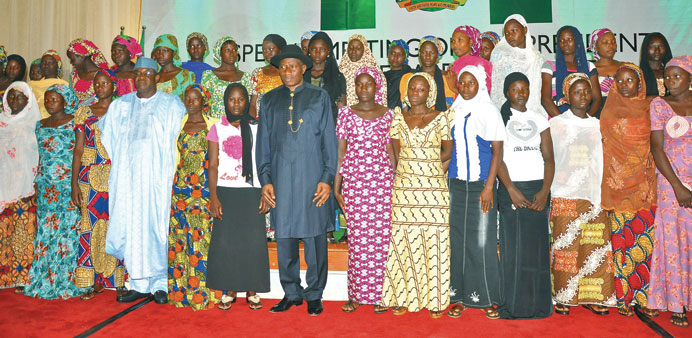Reuters/Maiduguri
An attack on a Nigerian army base in the northeastern town of Damboa and a massacres against civilians in surrounding villages over the weekend have left Boko Haram in effective control of a swath of territory, witnesses and security sources said.
While the insurgents have yet to establish bases in the small garrison town and nearby villages, a power vacuum has existed since Nigerian troops stationed there were pushed out two weeks ago. Raids on Damboa and six surrounding villages on the weekend also drove out 15,000 civilians, leaving the area largely in the hands of the Islamists.
That might represent Boko Haram’s biggest strategic success since a military offensive dislodged it from several cities and towns in Borno last year. Witnesses said the militants had set up road blocks and hoisted their black Al Qaeda inspired flags in some places around Damboa.
“Boko Haram have actually taken over our communities,” said Andrew Tada, a resident of Attagara village, one of those that emptied out after the weekend attack. “Boko Haram have sacked them and nobody dares go back.”
He said that residents had fled to the mountains during the attack. When they returned, the militants had gone but the town was deserted. Boko Haram fighters then set up road blocks.
Boko Haram, which is fighting to carve an Islamic state out of Nigeria, has ceaselessly targeted civilians this year.
A soldier posted to the Damboa road said a military offensive was underway to clear the Islamists out, but there had been no security forces in the Damboa area for two weeks.
Defence spokesman Major-General Chris Olukolade appeared to deny that Boko Haram had taken over Damboa and the surrounding areas on Monday, saying “our patrols are active and they are stepping up their activities to reverse any insecurity there”. But residents of Damboa fear a total takeover.
“If they can attacked the military the way they did and then come after us, it means they are on the ground in the town and nowhere is safe,” said Mohamedu Birma, who fled on Friday.
Security sources say Boko Haram are effectively pursuing a scorched earth policy, driving out authorities and anyone else who does not support their effort to create a de facto Islamic state.
Relatives scarred by Boko Haram’s mass abduction of Nigerian schoolgirls recounted their nightmare to president Goodluck Jonathan yesterday, in their first meeting with Nigeria’s leader 100 days after the shocking attack.
Jonathan, whose handling of the hostage crisis has been fiercely criticised, held talks in the capital Abuja with the families of the teenagers who are still missing as well as girls who escaped their Islamist captors.
Some of those who travelled from Chibok—the remote northeastern town assaulted by Boko Haram on April 14 -- burst into tears when the president entered the room, an AFP reporter said.
The talks were closed to the media but speaking afterwards one participant said the exchange was cordial, if inconclusive.
“It was a very peaceful and loving meeting. No arguments,” said Ayuba Chibok, who has nieces among the hostages.
Jonathan “said he would use every capability for the girls to come back... For me, I want to wait to see if there is improvement”, Chibok added. “I want to see action.”
There was a chance the meeting could turn hostile amid outrage over the response by the government and military to the April raid that saw 276 girls carted away on trucks from their school by the Islamist extremists. Fifty-seven girls have since escaped.
Jonathan hardly commented on the attack for weeks, while the military failed to launch a significant search-and-rescue operation and had to retract a statement claiming that all but eight of the girls had been freed.
Global condemnation of the attack then spread, backed the social media and a protest campaign Bring Back Our Girls, which drew support from prominent personalities including US First Lady Michelle Obama and actress Angelina Jolie.
Nigeria has since accepted Western military and technical help with the rescue effort, but there have been few signs of progress.
Jonathan assured the Chibok delegation that seeing the hostages “brought out alive... is the main objective of government,” presidential spokesman Reuben Abati told journalists.
The president listened as a group of girls described their escape from the Sambisa Forest Reserve, a Boko Haram stronghold in northeastern Borno state, where many believe the hostages are being held, Abati said.
Various people touched by the crisis “spoke their minds,” he added.
Presidential aides tried to organise a meeting in Abuja last week with a small group of the affected families, after Jonathan was urged to do so by the Pakistani girls’ education activist Malala Yousafzai.
Malala, who survived a Taliban assassination attempt in 2012, was in Abuja on her 17th birthday to campaign for the girls’ release.
The families balked at the invite, saying that if Jonathan was unwilling to travel to Chibok, he should bring all of the relatives to his office to meet with them as a group.
Ayuba Chibok said the meeting with Jonathan also addressed the deteriorating security situation in the northeast, where the Islamists have seemingly proved capable of attacking at will.
Civilians have often been left without military protection and crudely-armed vigilantes often serve as the only protection against Islamist fighters carrying anti-aircraft weapons and rocket-propelled grenades.
Aside from bringing the girls home, Jonathan was urged to make life safer for the families affected by the kidnapping, Chibok said. “We are tired of sleeping in the bushes,” he told AFP.

President Jonathan and senate president Mark with some of the school girls who escaped from the Boko Haram in Abuja yesterday.
